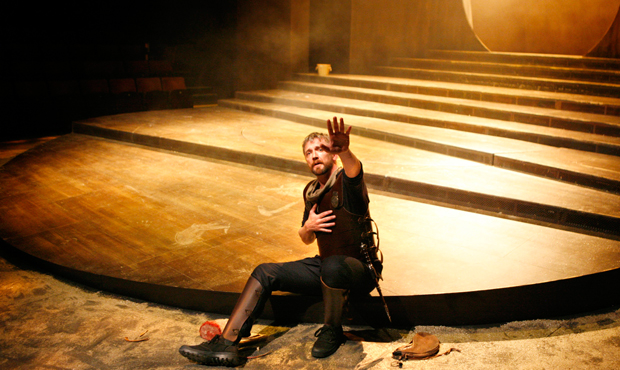The Odyssey: Missing Presumed Dead (Everyman, Liverpool)
Nick Bagnall joins forces with award-winning poet Simon Armitage to revive a classic text

© Gary Calton
In 2014's The Last Days of Troy, poet Simon Armitage gave us a re-telling of Homer's Iliad. Now he takes on The Odyssey, breathing new life into the classic text, with mixed results.
We kick off in Number 10. The PM is despatching his Transport and Communications Secretary to Istanbul to be the country's representative at a crucial England World Cup qualifying match. Smith, the Minister, gets involved in an ugly bar brawl with a bunch of hooligans, is blamed for the violent death of a local, Muslim, woman and has to make his escape sharpish.
All hell breaks loose in London. In Istanbul, the fleeing Smith falls through a dramatic time warp, becoming Odysseus embarking on his action-packed journey home to Ithaca across the eastern reaches of the Mediterranean.
From hereon in, the production cuts between ancient Greece and modern Westminster with a tube-tunnel, O-shaped, cavern framing the action. The slick politicking of the PM; the rapacious press besieging Smith's wife back home; all this is set against the creaking of Odysseus' lonely ship. Here's a proud man brought low, stripped of his family, his power, seeking his way back to normality, with just his wits and a small crew of men to bolster him. In Number 10 it's all jaw-jaw, in the Med it's raw.
The modern day resonances are, of course, palpable and the possibilities to mine this rich seam of metaphor are vast, but the action, swinging awkwardly as it does between modern and ancient, somehow castrates Armitage and the swell of his lyrical ambition is diminished.
There are, however, glimpses of genius at work in his writing: deliciously funny and prophetic one-liners ("the road to Damascus, that's the road to nowhere") and some mesmeric speeches that set off sparks. But a glimpse is all we really get before the action butts in and shrouds the language in often clunky theatrical business and predictable, even a little tedious, scene-setting.
I would rather director Nick Bagnall had focused more on the intimacy of the text rather than be distracted by half-hearted over-used dramatic devices: the salty sea shanties, the scene in the Commons, even Odysseus' protagonists, the Cyclops, Circe, Tiresias seem laboured.
Colin Tierney as the eponymous anti-hero stands out from a decent cast; his is a nimble, intense performance delivered in honeyed northern vowels. His line on the death of his mother – "I felt her go" – is delivered with heart-breaking clarity.
However, it's this soul-crunching emotion that's missing from the production as a whole, and it's only towards the end when the classical laments strike up, the lonely crying of a child is heard off-stage, and the wistful and plangent singing of the sirens fills the space that we get a sense of the poignancy of it all. But it's just too little, too late.
There's a good play in here, with horribly current and profound themes at work; released from its theatrical shackles, it could eventually become a great one.
The Odyssey: Missing Presumed Dead runs at the Everyman Theatre, Liverpool until 17 October after which it will tour the UK.












